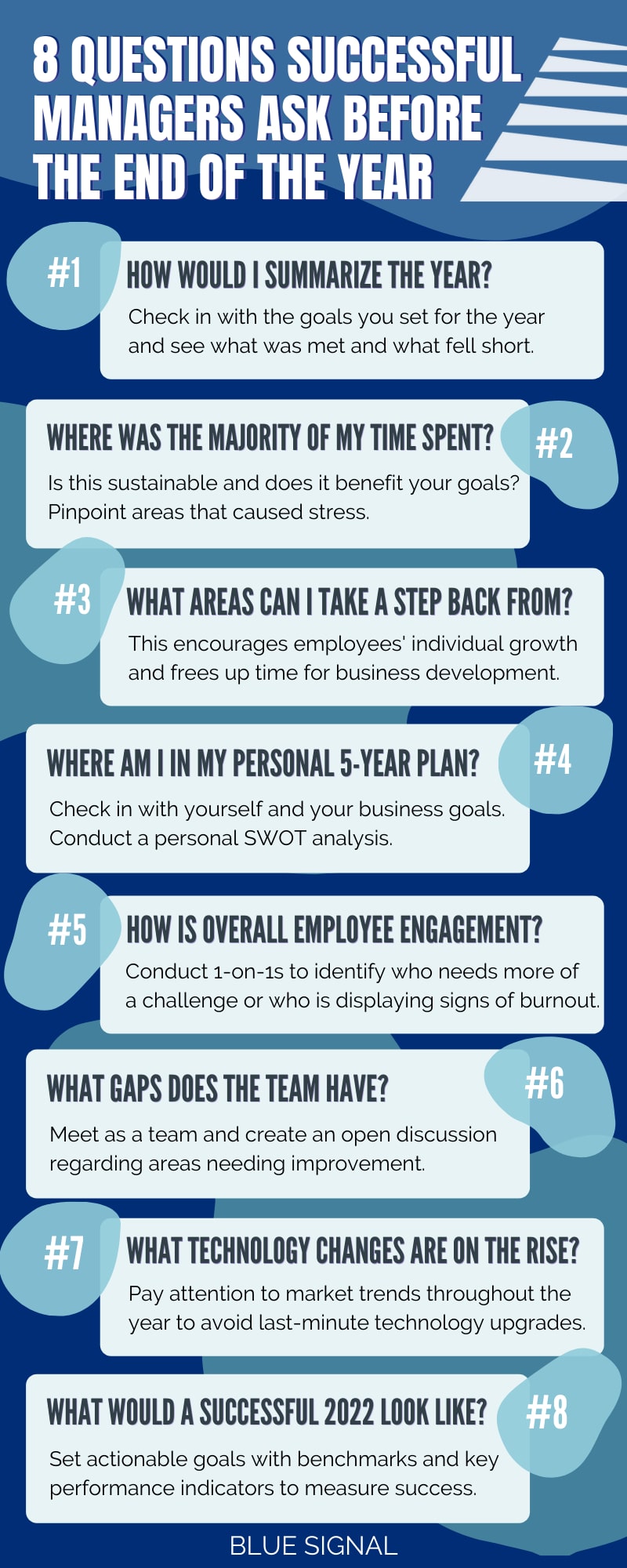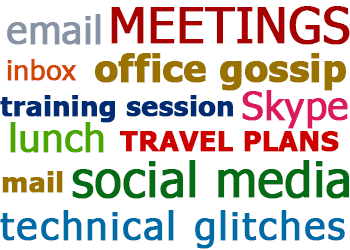The end of the year is filled with annual performance reviews, P&L reports, end-of-year budget meetings, a never-ending to-do list, and a thousand other holiday errands. As busy as the end of the year wrap up may be, the opportunity of a fresh start and a new strategic perspective on the coming year is something all leaders should take advantage of. That being said, good business strategy cannot be reduced to a quick planning meeting. It is important to prioritize the time to self-reflect and ask yourself the right questions, because the strategy you plan now has a direct and lasting impact on what your next year will look like. Palena Neale emphasizes that it is vital that leaders make time to reflect on the past year in relation to business goals, actions, values, successes and, of course, their "best" failures.
As you sit down to review the last 12 months and begin planning future strategies, it’s common to feel overwhelmed and left asking, “where do I start?” We’ve gathered a list of the top eight questions successful managers ask before the end of the year to ensure you get started on the right track in the year ahead. These questions are designed to zero in on the important things that tend to get overlooked in the holiday haste. As a best practice moving forward, you can also implement opportunities to review and follow up on these questions quarterly. Checking in on these main ideas will lead to a more realistic view of the overall year and in turn be a more productive use of your time.

Question #1: How would I Summarize the Year?
Looking back on the entire year can seem daunting but it’s a great first step in your reflection process. Take a step back and review the past year as a whole. How would you summarize the outcome? Check in with the business goals you had set for the year and see what was met and what fell short. Take this time to dive into the overall performance of your team, individual employees, and most importantly, yourself as a manager.
When looking at the overall performance as a team and individual employees, it’s important to remind yourself to humanize the workplace. It’s okay to report on highs and lows of the year and have open conversations around both. Collaborate with your team about next steps and break down the work that comes from it. When evaluating yourself, don’t be afraid to be brutally honest and truly look for areas of improvement. Once you gather your findings in each area, ask yourself what you can learn from each. List out clear takeaways that you can turn into actions items to accomplish in the future.
Question #2: Where was the Majority of My Time and Energy Spent in 2021?
Pull research and look back to find where your time was allocated the most and where it was lacking in the past year. Are these findings sustainable going forward? Do they make sense in relation to your business goals? When looking at how time was spent, try to pinpoint what caused stress and be aware of signs of burnout.
Stress in leadership can lead to more negative effects than just personal wellbeing – businesses in the US suffer a $300 billion loss every year because of workplace stress. Additionally, almost 60% of leaders reported feeling tired at the end of each day, which can be an indication of burnout. One recent survey found that 44% of leaders who felt worn and used up planned to move to a new company in order to advance their careers. When deciding how to disperse your time, remember that when you’re at your personal best, the company can succeed. Inga Bielińska, a coaching and consulting mentor, recommends looking at the coming year’s agenda and planning for family events to participate in, friends’ reunions or routine outings to go to, winter holidays, summer holidays, and regular “me time” to help combat stress.
Question #3: What Areas Can I Take a Step Back From?
According to a recent survey, developing the next generation of leaders is the top challenge for 55% of CEOs. In most cases, taking a step back will create the opportunity to delegate tasks and responsibilities to those who are ready to step up in the company. This allows you to encourage individual growth on your team and it frees up your time for overall business development opportunities. It’s a win-win. Remember it’s your team who has led the company to its success so far. Trust them to take on more responsibility and show you what they can do!
Once you identify areas you are able and willing to delegate, set aside the time and resources you’ll need to properly train the individuals taking them on. Avoid throwing anyone in the deep end and make sure they are confident in their new role and expectations. Additionally, schedule future meetings to follow up on how things are going after team members have had time to settle into those new responsibilities. This will allow them the opportunity to ask questions and will ensure you are both on the same page moving forward.
Question #4: Where am I in My Personal Five-Year Career Plan?
This is the time to be a little selfish. Just as you would evaluate business performance, it’s equally important to conduct personal evaluations. Check-in with yourself and your business goals – more specifically, where you are in your 5-year plan. You can do this by conducting a personal SWOT analysis and looking at it from a technical standpoint. Loren Margolis, from Training & Leadership Success LLC, suggests asking yourself questions such as, "What are my top leadership strengths and weaknesses?", "What are my growth opportunities?", and "What are the internal (mindset) and external (marketplace) threats to my success?"
In the same sense, take this time to revisit your long term goals. When answering these questions, you’ll determine if you’re on track with your goals and certain areas that need more attention. Remember that all goals are works in progress and you can add and adjust them based on where you are today. Once you’ve reflected and updated, you’ll need to develop an actionable plan to continue on the path to meeting those milestones.
Question #5: How is Overall Employee Engagement?
Once you take a look at your personal progression, the next step is to do the same for your team. This starts with evaluating employee engagement. Studies show that 78% of business leaders are focused on improving their engagements with employees. In turn, engaged employees outperform their peers that are not engaged – and overall, companies with high employee engagement are 21% more profitable. A good place to start asking the right questions is during employee performance reviews. G. Riley Mills, from Pinnacle Performance Company, shares that “despite common conceptions about workers receiving performance-based feedback, research shows that they not only want it, but they also want to give it to you. A whopping 65% of workers want more feedback – and that number swells to 80% for younger workers (76% of which also want to give their bosses feedback).”
Before the new year, carve out the necessary amount of time to meet with employees one-on-one to touch base. Take this opportunity to notice anyone starting to show symptoms of burnout, or those who need more of a challenge. Be sure to set the necessary follow ups to discuss next steps and note who will need more attention in the coming year.
Question #6: What Gaps Does the Team Have?
No team is perfectly balanced all the time, especially when the company needs to make changes to stay competitive – and that’s okay. When looking for gaps, it’s easiest to tackle this separately from performance reviews. Individual annual performance reviews are critical, but they don’t give a holistic, big-picture view of a team. Meet as a team and create an open discussion regarding where employees are noticing gaps – be open to feedback.
Once identified, categorize them by priority. Which gaps are the most important to close and which are less urgent? Analyze what it would take to close them, such as incentives for the team to work harder, redistributed duties, improved technology, new hires, or more training. Prioritize which gaps to close based on projects and available resources. Oftentimes this can lead to the realization of necessary budget increases for departments. Going into that discussion with this tangible analysis can help increase chances of approval.
Question #7: What Technology Changes are Around the Corner?
Automation, smart devices, IoT, cloud computing, and other advances are changing the landscape very quickly, even in businesses outside the technology industry. No matter the industry, ask yourself how you will remain innovative in the near future. As remote work has taken off in the past two years due to Covid-19, technology and processes have advanced quickly to meet the communication standards among teams working across the country. Many businesses have identified software, programs, and devices to implement or better utilize for reliable internal communication, streamlining processes, remote work, etc. The innovation of 5G has brought a particular shift in advancing technology we use daily.
More specifically – cybersecurity has proven to be more important every year. It’s crucial to keep teams up to date about what skills they need to stay competitive. Additionally, pay attention to market trends throughout the year – last-minute technology upgrades are never convenient or cheap. After you reflect on these points, you may find it’s time to hire new IT professionals or teams to manage internal technology advancements. Remember that Blue Signal can help!
Question #8: What Would a Successful 2022 Look Like to Me?
After all the self-reflection and input from the team, the last step is to set business goals and intentions for the year. The hardest part of goal-setting is being realistic. Keep in mind – not all dreams should be goals. A great place to start when mapping out your business goals is to ask yourself what will stay the same, what will change, and how. All of these answers should lead to insightful follow up questions and provide you with the necessary steps needed to plan for success.
When setting these intentions, it’s important to focus on hard numbers and actionable projects. In turn, this helps outline expectations and clearly communicates what considers a goal complete. The best goals have benchmarks and key performance indicators to measure success along the way. A great tip is to dig up your previous business goals - not just from this last year, but 3-5 years back - and look for trends. Look for similar, overly ambitious goals you tend to make year after year and decide how to make them more achievable or choose to scrap them altogether. If you find yourself getting stuck and unsure of what’s important, ask your team for input! This will ensure all department’s individual business goals are represented in some way when it comes to the company’s future plans.
Once you’ve settled on your goals – memorize them. Throughout the year you should be able to clearly visualize what you’re going to accomplish – almost manifesting the outcome. Share company business goals with your team as well and remind them to refer back to them often.
In the busy month of December, it is easy to get buried in small tasks and miss critical opportunities to get ahead in the coming year. Optimizing these questions can help you stay organized and zero in on important business goals and action items to take. When reflecting, remember to celebrate the wins as a team and try not to tread on the goals you didn’t hit. A new year is the perfect opportunity to clean the slate and start fresh with an ambitious mindset. Alexsys Thompson, from Alexsys Thompson Intl., states that “as a leader reviews the wins and losses of the previous year, it is powerful to revisit the wins that were experienced, and acknowledging the misses through story will help ensure lessons are taken forward as valuable learning experiences.”
As you build out your 2022 strategy, remember Blue Signal can be a vital resource! Our seasoned recruiters can partner with you to help answer these questions and deliver action items related to hiring to hit your business goals in the year to come. Contact our qualified team of recruiters to learn more about the wide range of services we offer.



